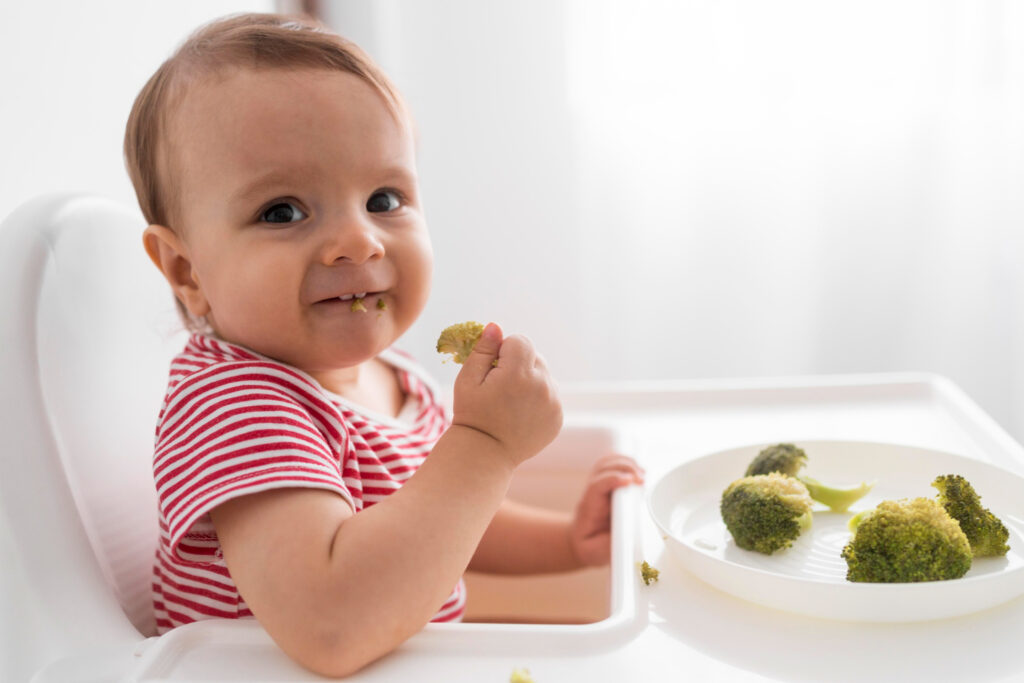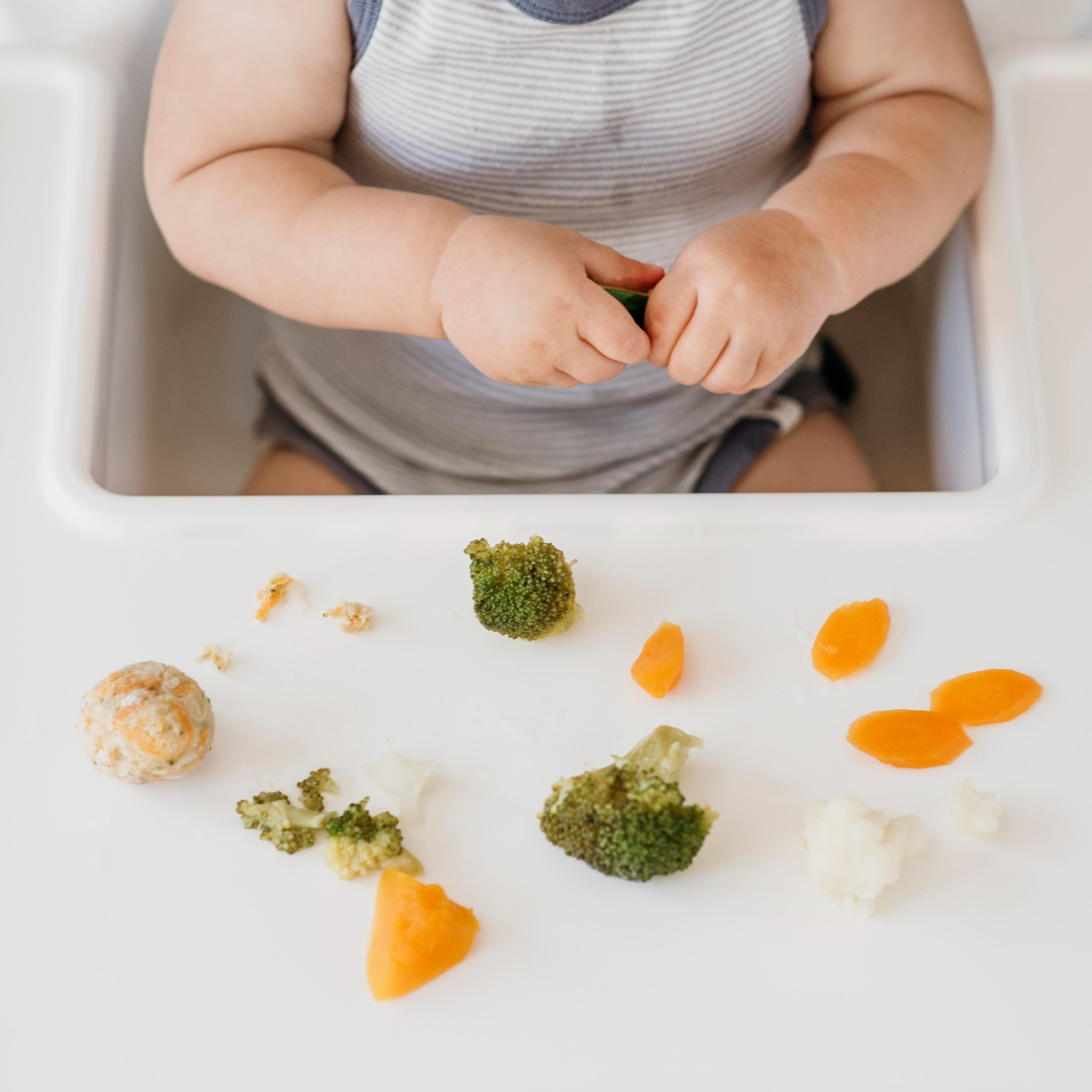Iron is a key component that supports newborns’ growth and development; hence, iron rich foods for babies are needed. Iron serves various key functions in the body, and it is especially crucial throughout childhood for the following reasons:
Brain Development:
Iron is required for the brain development of a newborn. During the earliest years of life, the brain grows rapidly, and iron is essential for the formation of neuronal connections that assist learning and cognitive development.
Healthy Blood:
Iron is an essential component of hemoglobin, a protein found in red blood cells that transports oxygen from the lungs to the body’s organs. Babies require iron to generate hemoglobin, which ensures that their bodies have adequate oxygen flowing to support overall health and growth.
Immune System Support:
Iron has a role in immune system function. A best iron rich foods for babies aid in the development of a strong immune response in newborns, making them less vulnerable to infections and diseases.
Energy generation:
Iron is required for energy generation within cells. It aids in the conversion of food into energy, which is necessary for a baby’s development, physical activity, and general well-being.
Preventing Anemia:
Iron deficiency anemia is a disorder in which the body does not have enough iron to create appropriate hemoglobin, resulting in fatigue, weakness, and other health concerns. Babies are vulnerable to iron deficiency anemia, particularly after the first six months of life, when their iron reserves begin to decline. Iron-rich diets can aid in the prevention of this illness.
Given the significance of iron for newborns, it is normally suggested that they begin eating iron rich foods when they begin complementary feeding, which is usually about 6 months of age.

Examples of iron rich foods for babies include:
Iron-fortified cereals:
Because they are high in iron, they are frequently the first solid meals presented to newborns.
Meat:
Meat, such as pureed chicken, beef, or turkey, is a good source of heme iron, which the body quickly absorbs.
Fish:
Iron-rich salmon and trout supply the needed omega-3 fatty acids for brain development.
Legumes:
Plant-based iron sources include beans, lentils, and chickpeas, although the iron in plant-based meals (non-heme iron) is less easily absorbed than heme iron from animal sources. Combining these meals with vitamin C-rich foods can improve iron absorption.
Iron-enriched baby foods:
To ensure that babies get enough iron, several commercial baby food items are fortified with it.
Leafy green vegetables:
While not as abundant in iron as other sources, leafy green vegetables such as spinach and broccoli can help a baby’s iron intake.
To satisfy their nutritional needs and promote their kids’ healthy growth and development, parents and caregivers must provide a balanced diet that includes a range of iron-rich foods. If you are concerned about your baby’s iron consumption or nutritional health, get advice from a doctor or a qualified dietitian.
A physician or healthcare expert should always be consulted before selecting an iron supplement for a newborn. They can evaluate your baby’s individual needs and advise you on the best type and amount of iron supplements. Furthermore, it is critical to ensure the safety and efficacy of any supplement provided to a newborn.
Here are several iron supplements for babies that are regularly used:
Ferrous Sulfate Drops:
Ferrous sulfate drops are a type of liquid iron supplement that is commonly given to babies. They come in a variety of brands and often contain ferrous sulfate, a well-absorbed type of iron. To make these drops more appealing to newborns, combine them with a tiny bit of juice or water.
Ferrous Fumarate Drops:
Ferrous fumarate is another type of iron supplement that is commonly used in infants. It comes in liquid form and is easily absorbed by the body. It can be combined with a tiny amount of liquid, just like ferrous sulfate drops.
Ferrous Gluconate Drops:
Ferrous gluconate is a gentler kind of iron supplement that may be appropriate for newborns who experience gastrointestinal discomfort while taking other forms of iron. It is accessible as a liquid.
Iron Multivitamin Drops:
To guarantee general nutritional balance in the baby’s diet, some physicians may offer iron supplements that also contain other critical vitamins and minerals, such as vitamin D or calcium.
Iron-Fortified Baby Cereal:
As a source of additional iron, physicians may recommend introducing iron-fortified baby cereal into a baby’s diet in some situations. This may be a more natural method of increasing iron consumption.
It’s critical to follow your pediatrician’s recommendations for your baby’s iron supplement, dosage, and duration of supplementation. When making their recommendations, they will take your baby’s age, general health, and any specific iron-deficiency issues into account. Furthermore, always take iron supplements as directed and never take more than the suggested dose, since too much iron can be dangerous.
When giving iron supplements to your baby, consider these tips:
Follow your healthcare provider’s instructions for taking the supplement.
To measure and administer the right amount, use a clean dropper or syringe.
Iron drops should not be used with milk or dairy products because calcium can interfere with iron absorption.
Give the supplement at the times specified, with or without meals.
To avoid accidental overdoses, keep the supplement out of the reach of minors.
Follow-up visits with your physician are essential for monitoring your baby’s iron levels and ensuring that the supplement is effective and well-tolerated.

